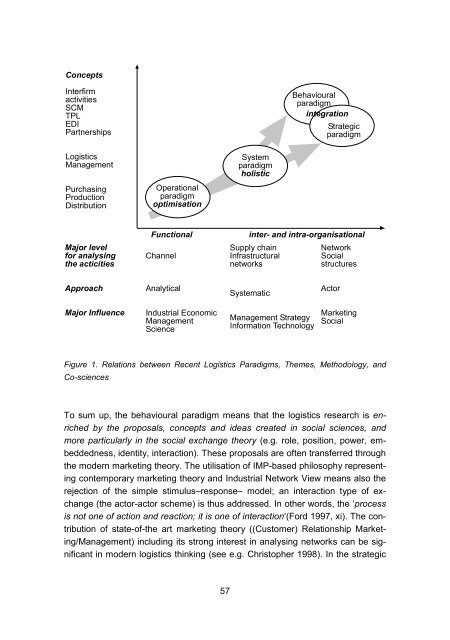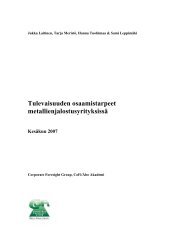849954 sisus
849954 sisus
849954 sisus
You also want an ePaper? Increase the reach of your titles
YUMPU automatically turns print PDFs into web optimized ePapers that Google loves.
Concepts<br />
Interfirm<br />
activities<br />
SCM<br />
TPL<br />
EDI<br />
Partnerships<br />
Logistics<br />
Management<br />
Purchasing<br />
Production<br />
Distribution<br />
Major level<br />
for analysing<br />
the acticities<br />
Approach<br />
Major Influence<br />
Operational<br />
paradigm<br />
optimisation<br />
Channel<br />
Analytical<br />
Industrial Economic<br />
Management<br />
Science<br />
57<br />
System<br />
paradigm<br />
holistic<br />
Functional inter- and intra-organisational<br />
Supply chain<br />
Infrastructural<br />
networks<br />
Systematic<br />
Management Strategy<br />
Information Technology<br />
Behavioural<br />
paradigm<br />
integration<br />
Strategic<br />
paradigm<br />
Network<br />
Social<br />
structures<br />
Actor<br />
Marketing<br />
Social<br />
Figure 1. Relations between Recent Logistics Paradigms, Themes, Methodology, and<br />
Co-sciences<br />
To sum up, the behavioural paradigm means that the logistics research is enriched<br />
by the proposals, concepts and ideas created in social sciences, and<br />
more particularly in the social exchange theory (e.g. role, position, power, embeddedness,<br />
identity, interaction). These proposals are often transferred through<br />
the modern marketing theory. The utilisation of IMP-based philosophy representing<br />
contemporary marketing theory and Industrial Network View means also the<br />
rejection of the simple stimulus–response– model; an interaction type of exchange<br />
(the actor-actor scheme) is thus addressed. In other words, the ‘process<br />
is not one of action and reaction; it is one of interaction‘(Ford 1997, xi). The contribution<br />
of state-of-the art marketing theory ((Customer) Relationship Marketing/Management)<br />
including its strong interest in analysing networks can be significant<br />
in modern logistics thinking (see e.g. Christopher 1998). In the strategic








